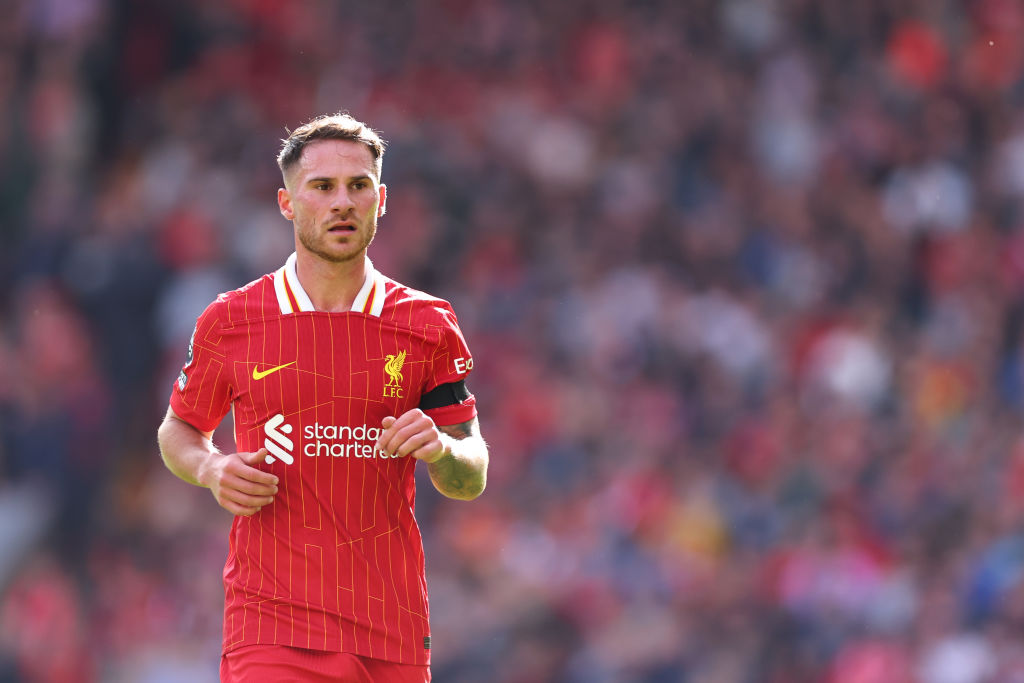The 50 Best Football Books Ever: 50-41
In need of a good read? Seeking Christmas presents to buy or be bought? Peruse our list of the finest football books available...
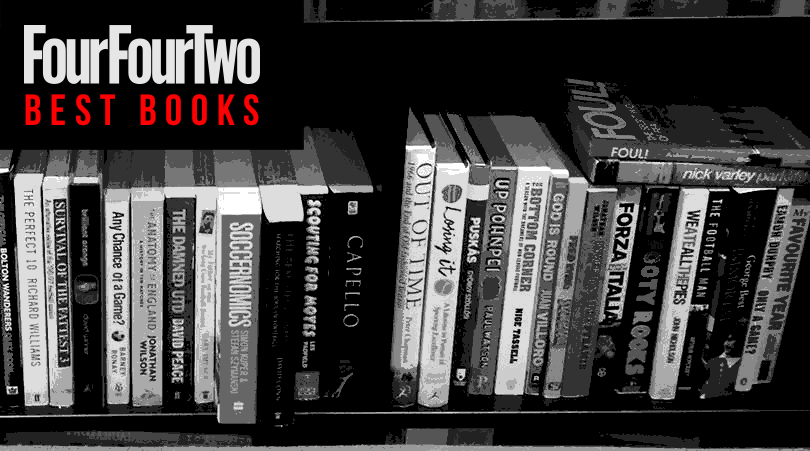
There are tens of thousands of football books. Many of them are rubbish, hackwork "auto"biographies of empty-headed players with neither the gall nor the wit to say anything of interest.
There are, however, dozens of brilliant football books, works which will entertain and, yes, educate you. At FFT we love a good read; here are our recommendations, selected from writers far and wide. Let us know your bedside bibles at #FFTBestBooks – and share your "shelfies" of your football-book libraries at #FFTshelfies...
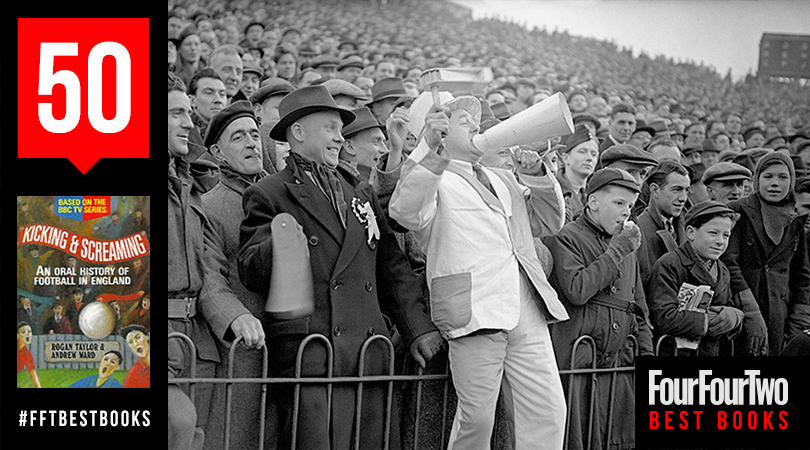
50. Kicking and Screaming
An Oral History Of Football In England – Rogan Taylor & Andrew Ward, 1995
A perhaps curious one to start with: conversations which became a TV programme which became a book. This is the only all-encompassing oral history of football in the 20th century, pulling together all the strands which make up football’s fabric.
The testimonies, which formed the basis of an award-winning BBC TV series, range from Zillwood March’s comments on football in 1900 to Bestie’s revelations about life in the ’60s. Fans who packed the terraces in the ’30s talk of “hotlegs” and West Ham United supporters reveal the strength of feeling against the club’s bond scheme proposal in the 1990s.
Whether it’s Sir Tom Finney’s “jumpers for goalposts”, Len Shackleton admitting to receiving £25 backhanders in the 1940s, or Ian Wright discussing astronomical wages in the 1990s, this is an indispensable guide to how football was dragged – kicking and screaming – towards the 21st century. Jon Spurling
Get FourFourTwo Newsletter
The best features, fun and footballing quizzes, straight to your inbox every week.
–––––––––––––––––––––––––
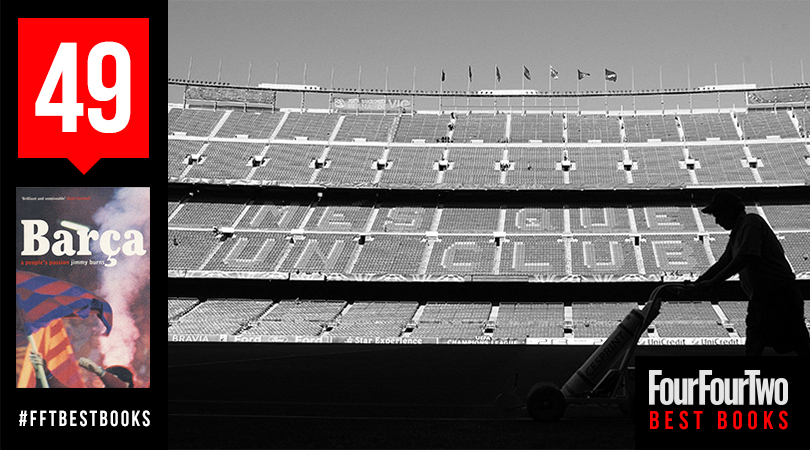
49. Barça
A People’s Passion – Jimmy Burns, 1999
Skip the pompous foreword and accept that the prose style can be as stuffy as the house style of the FT, where the author worked, and you’ll reap the rewards. Burns’ history of a club, 100 years of Catalan pride and some of the game’s most fascinating personalities (Cruyff, Maradona, Rinus Michels, Romario et al) is carefully researched, well-observed, and packed with fascinating stories.
Barça may now be synonymous with the likes of Cruyff and Ronaldinho, but Burns gives a fair share of the limelight to those who have played vital cameo roles in the drama. Personalities like Patrick O’Connell, the former Manchester United star who hung on as the coach even after his president had been shot by Franco loyalists, and Vic Buckingham, the English coach who restored Barça’s self-respect, despite reminding players of Henry Higgins, Rex Harrison’s character in My Fair Lady. Paul Simpson
–––––––––––––––––––––––––
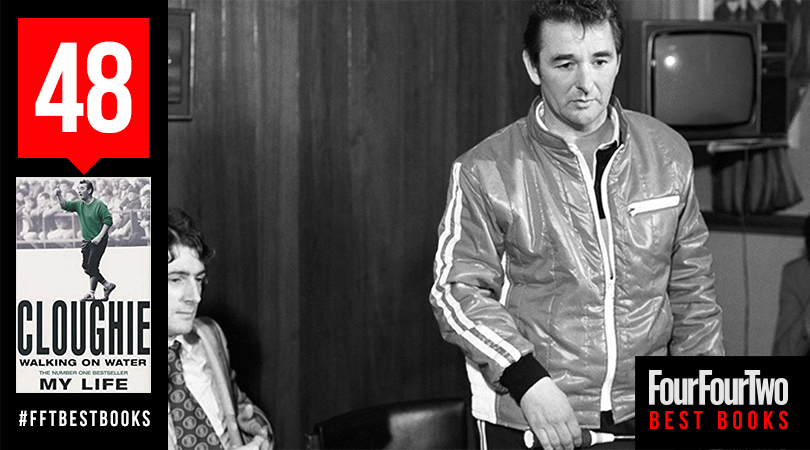
48. Cloughie
Walking on Water: The Autobiography – Brian Clough, 2002
As the second of Clough’s two autobiographies (after 1995’s Clough: The Autobiography), Walking on Water perhaps understandably contains some familiar tunes. Cloughie rants about the directors who incensed him over the years, and provides sharp insights into the successful sides he built at Nottingham Forest and Derby County during the 1970s. But many of the lines are delivered with a degree of mournfulness. Ol’ Big ’Ead expresses regret about his homophobia towards the late Justin Fashanu, and he is open and candid about his alcoholism.
Perhaps the biggest sea-change lies in his attitude towards former assistant Peter Taylor, to whom the book is dedicated. The Forest manager missed Taylor both professionally and personally in his later years at Forest, and the guilt he felt after Taylor’s death in 1990 (the pair didn’t speak for the last eight years of Taylor’s life) hastened his own physical decline. In the loudly moneyed Premier League era, the pair’s monumental achievements at two provincial clubs will never be repeated. An irresistible tale. Jon Spurling
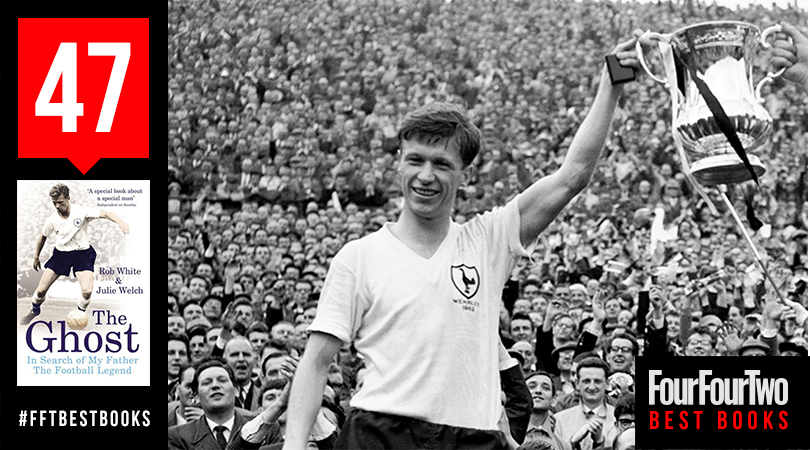
47. The Ghost
In Search Of My Father, The Football Legend – Rob White & Julie Welch, 2011
John White was an ever-present member of Tottenham Hotspur's legendary Double-winning side of 1960-61, his ability to creep into the opposition penalty area almost unnoticed earning him the nickname 'The Ghost'.
Then, on July 21, 1964, White was killed when the tree he was sheltering beneath during a rain-interrupted round of golf was struck by lighting. He was just 27 years of age, and left behind widow Sandra, two-year-old daughter Amanda, and six-month-old son Robert.
Naturally, Rob had no memory of his father, so, with the help of Julie Welch – a Spurs fan and Fleet Street's first female football writer – he set about tracking down John's friends, family and former team-mates in order to paint a picture of the man, rather than just the footballer. This book not only tells the story of a world-class inside-forward, but also represents a unique, touching and deeply personal journey for a son trying to get closer to his father. James Maw
–––––––––––––––––––––––––
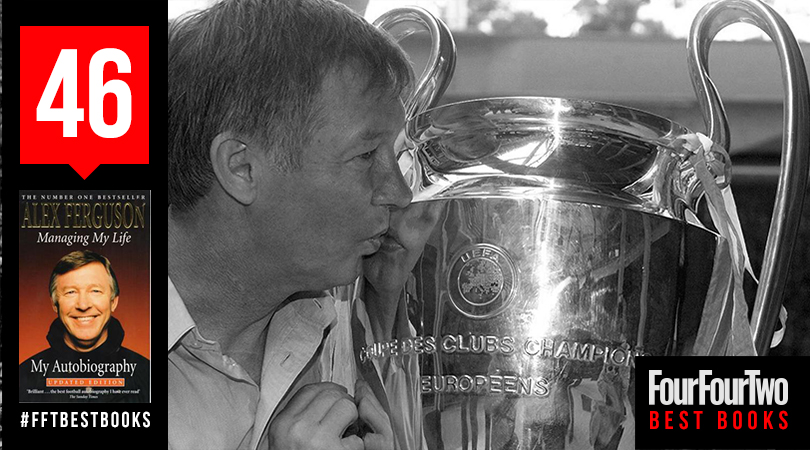
46. Managing My Life
My Autobiography – Alex Ferguson, 1999
After his side won the Treble in 1999, publishing houses fought the mother of all bidding wars for the rights to publish Sir Alex Ferguson’s autobiography. Hodder Headline’s successful £1.1 million bid was met with ridicule. How could they possibly make that back in sales, asked ‘those in the know’?
“Explosive” extracts in the Telegraph and The Sun – including criticism of his former assistant Brian Kidd – were met with consternation in some quarters. But all publicity is good publicity – the book sold in bucketloads, and HH had the last laugh.
Michael Crick’s The Boss: The Many Sides of Alex Ferguson obviously presents a far more rounded view of the Scot: the bullying episodes and the United boss’s rocky relationship with several journalists are entirely absent from Managing My Life. But if you want to know why United dominated football in the ’90s, this book goes a long way to providing the answers. Jon Spurling
–––––––––––––––––––––––––
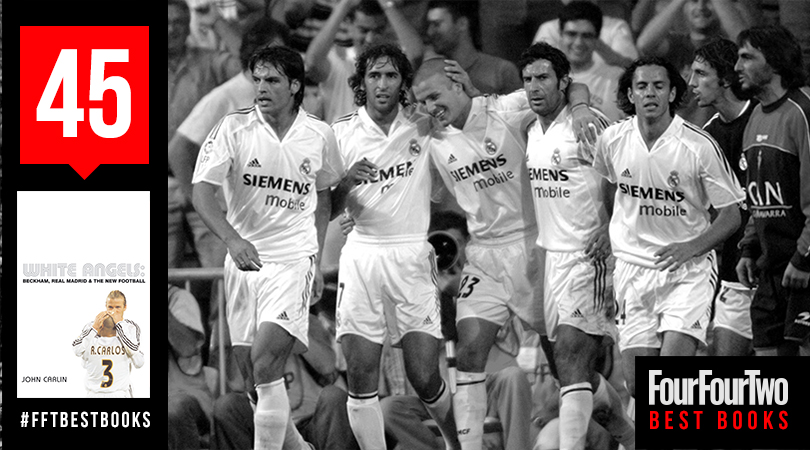
45. White Angels
Beckham, Real Madrid & The New Football – John Carlin, 2004
In 2004, too many trees were felled by publishers wanting to tell us what we already knew about El Becks and Real Madrid. This is the best of them, elevated by Carlin’s astonishing access and his talent.
Carlin offers a lovingly detailed portrait of the club and the galacticos experiment, which soon looks passé as sides like Porto win with teamwork, not individuality. At times, it feels like a well-written, intelligent hagiography of Florentino Perez. Directors even joke that they could win with a fan playing. Such hubris is rewarded with defeat by Monaco and Fernando Morientes – a reject deemed insufficiently galactical, giving a valuable insight into what happens when a club believes its own hype. Jonathan Wilson
–––––––––––––––––––––––––
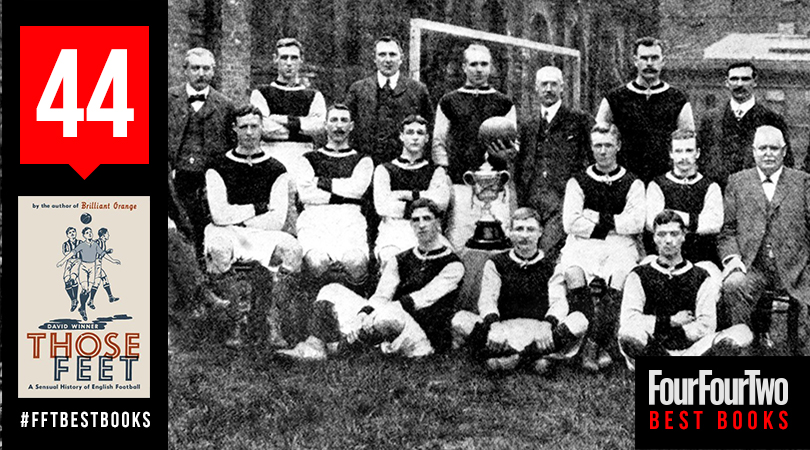
44. Those Feet
A Sensual History Of English Football – David Winner, 2005
A classic, if only for its finding that modern football was invented in Victorian public schools to keep boys from masturbating, the idea being that if boys were expending energy in teams, they couldn’t be alone engaging in “self-pollution”. The book takes the familiar idea of studying football culture in one country, and applies it to England itself, as if it were a foreign land.
Winner seizes on the rich and bizarre popular culture that has accreted around the English game – Roy of the Rovers, The Italian Job, Neasden FC in Private Eye, etc – and mines these artefacts for truths about England. Funny and illuminating, the book’s one problem is that it was researched mostly in libraries, so it lacks the weird first-person encounters that made Winner's Brilliant Orange so good. Simon Kuper
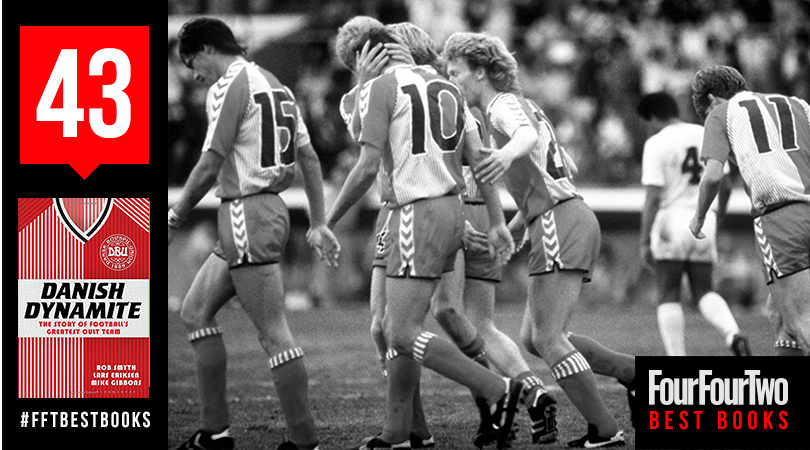
43. Danish Dynamite
The Story Of Football’s Greatest Cult Team – Rob Smyth, Lars Eriksen & Mike Gibbons, 2014
Fans of a certain age go misty-eyed at the mention of the mid-’80s Denmark side. A collection of colourful characters in an iconic Hummel kit, Sepp Piontek’s side produced frequently mesmerising attacking football that seemed ahead of its time. Certainly their globetrotting players foreshadowed more recent economic migration among footballers: as this book points out, their Mexico 86 squad included players from the champions of Italy, West Germany, England, Holland and Belgium.
Players like Michael Laudrup, Jesper Olsen, Jan Molby, Soren Lerby and Preben Elkjaer gave this team an almost effortless cool, and they followed Euro 84’s semi-final shootout defeat with an unforgettably explosive Mexico 86. Interviews with almost all the protagonists gives the book its backbone, while the authors’ boyish enthusiasm impels you to trawl YouTube for supporting evidence (it’s there, in spades: enjoy).
That the book somewhat screeches to a halt around 1988, almost totally omitting the far more functional Euro 92 triumph, is understandable. The surprise glory across the Oresund in Sweden is literally another story, an against-the-odds fairytale with a different manager, a largely different squad and a much less attractively expressive aesthetic. Like Brazil 82, the mid-’80s team were about much more than mere results; that should be celebrated, and this book does just that. Gary Parkinson
–––––––––––––––––––––––––
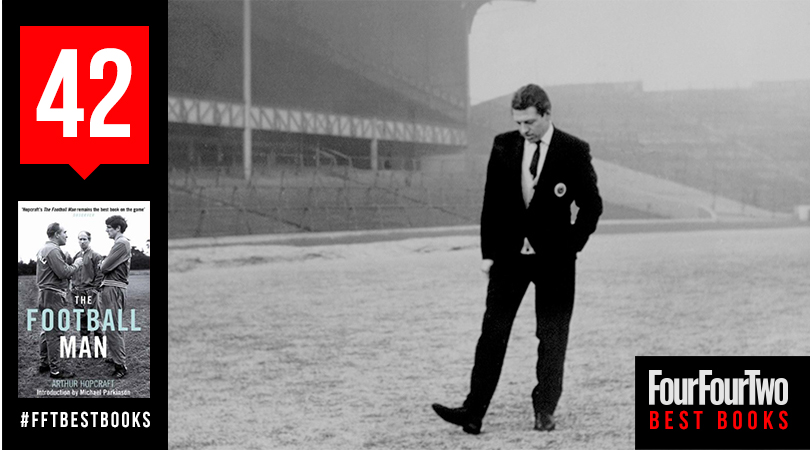
42. The Football Man
People And Passions In Soccer – Arthur Hopcraft, 1968
When this was first published in 1968, managers were sacked too quickly for too little cause, the game was complaining about bad publicity and violence among players was a cause of national concern. There’s much in this oft-quoted study of British football to reinforce the cliché that the more things change the more they stay the same, but there are revealing differences. Agents are barely mentioned, while professional referees are a pipe dream.
This enduring great owes much to Hopcraft’s obvious, anxious love for the game, the candour he inspires in his interviewees (Bobby Charlton and Don Revie among them) and his descriptive powers. Of one amateur game he notes: “Escaped poodles frisk among players’ legs, lads with Rolling Stones haircuts collide with static veterans like gollywogs flung against a nursery wall.” Paul Simpson
–––––––––––––––––––––––––
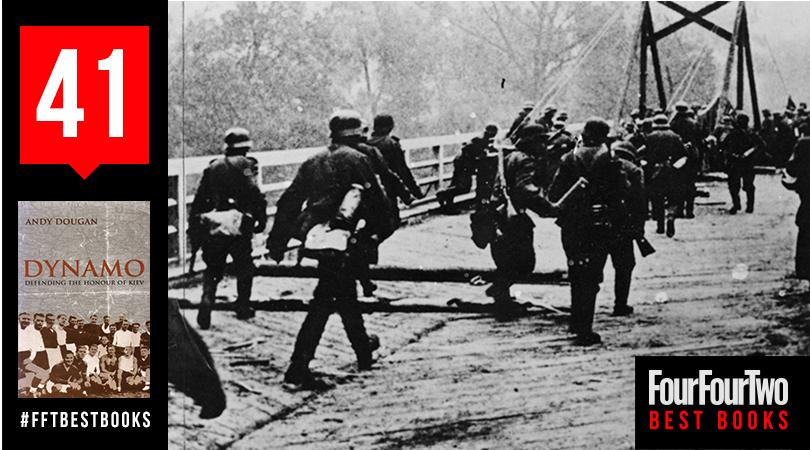
41. Dynamo
Defending The Honour Of Kiev – Andy Dougan, 2001
If the story is good enough, the rest will follow. Ignore the clunking dramatisation of the opening chapter: once Dougan switches to journalistic narrative, history takes over. This is a book of remarkable research, cutting through the myths that obscured what happened when Dynamo Kyiv played the Luftwaffe in 1942.
Communist myth had the SS shooting at the Ukrainians during the game, with survivors shot at the final whistle; the truth was rather more prosaic, but no less tragic. A team based around several Dynamo players working at the same bakery did beat a team representing the Luftwaffe, and afterwards all 11 were rounded up for interrogation. Dougan shows how one died under torture, three were executed and one disappeared, and in rescuing their tale from propaganda does Ukrainian football a great service. Jonathan Wilson
Gary Parkinson is a freelance writer, editor, trainer, muso, singer, actor and coach. He spent 14 years at FourFourTwo as the Global Digital Editor and continues to regularly contribute to the magazine and website, including major features on Euro 96, Subbuteo, Robert Maxwell and the inside story of Liverpool's 1990 title win. He is also a Bolton Wanderers fan.
